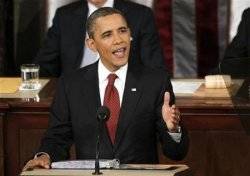US President Barack Obama has called for higher taxes on the rich and new remedies for the country's mortgage crisis in a State of the Union address aimed at convincing voters to give him a second term.
Speaking to Congress on Tuesday, Obama proposed sweeping changes to the tax system, most notably, a minimum 30 per cent effective rate on millionaires, to eliminate inequalities that allow the wealthy to pay lower rates than the middle class.
"It's time to apply the same rules from top to bottom: no bailouts, no handouts, and no cop-outs. An America built to last insists on responsibility from everybody," he said.
Al Jazeera's Patty Culhane, reporting from Washington, pointed out that Obama's speech was the "unofficial kick-off to his campaign."
"The president is not just talking to Congress, he was talking to voters. Not just about what he wants to do in 2012, but he is talking about 2013, [and] what he wants to do if Americans give him a second chance," she said.
Culhane continued: "The narrative he is trying to convey is that the Republicans only care about wealthiest Americans, but he cares about the rest. That’s why he is talking about raising taxes on the wealthy."
Obama's message could resonate in the 2012 campaign following the release of tax records by Mitt Romney, a potential Republican rival and one of the wealthiest men to ever run for the White House.
Romney, a former private equity firm chief, and his wife paid an effective tax rate of 13.9 per cent in 2010 and expect to pay a 15.4 per cent rate for 2011, tax rates that are far below the top rate of 35 per cent on ordinary wages.
A new proposal outlined by Obama to ease the way for more American homeowners to get mortgage relief, and to pay for the plan with a fee on banks blamed for helping create the housing crisis, also struck a strong note of populism.
"Millions of Americans who work hard and play by the rules every day deserve a government and a financial system that does the same," Obama told the joint session of Congress.
Taxes are the most divisive issue at the heart of this year's presidential campaign when Obama is seeking re-election despite a slow economic recovery and a high jobless rate.
Democrats have criticized Republicans in Congress for supporting tax breaks that favor the wealthy while Republicans staunchly oppose tax rises, even on the richest US citizens, arguing they would hurt a fragile economic recovery.
"We can either settle for a country where a shrinking number of people do really well, while a growing number of Americans barely get by," Obama said.
"Or we can restore an economy where everyone gets a fair shot, everyone does their fair share, and everyone plays by the same set of rules."
Obama used the speech to revive his call to rewrite the tax code to adopt the so-called "Buffett rule," named after the billionaire Warren Buffett, who says it is unfair that he pays a lower tax rate than his secretary.
To underscore Obama's point about tax inequality, Buffett's secretary, Debbie Bosanek, was seated in the First Lady's box in the House of Representatives for Obama's annual address.
Election tactics
Mitch Daniels, the Indiana governor who was chosen to give the official Republican response to Obama, accused the president of adopting divisive election-year tactics.
"No feature of the Obama presidency has been sadder than its constant efforts to divide us, to curry favor with some Americans by castigating others," Daniels said, according to excerpts of his speech.
John Boehner, the House of Representatives speaker and top congressional Republican, accused Obama beforehand of promoting the "politics of envy" and insisted the election would be a referendum on the president's "failed" policies.
The US unemployment rate was 8.5 per cent in December. No president in the modern era has won re-election with the rate that high.
In a new advertisement, Romney, who earlier said Obama's State of the Union must be his last, compared the hope whipped up by the president in 2008 to his actual job performance.
"Three years ago, we measured candidate Obama by his hopeful promises and his slogans. Today, President Obama has amassed an actual record of debt, decline and disappointment," Romney said.
Iran crisis
Obama also touched on several simmering foreign crises, including the deepening nuclear showdown with Iran.
"Let there be no doubt. America is determined to prevent Iran from getting a nuclear weapon, and I will take no options off the table to achieve that goal," Obama said.
"But a peaceful resolution of this issue is still possible, and far better, and if Iran changes course, and meets its obligations, it can rejoin the community of nations."
Obama hailed the killing of Osama bin Laden last year by a US special forces team and said he had kept his promise to end the Iraq war - US troops withdrew from the country last month - as election-year proof of his credentials as commander-in-chief.
Taking aim at China, an election-year target of Republicans and Democrats alike over its currency and trade practices, Obama proposed creation of a new trade enforcement unit within the federal government.
PHOTO CAPTION
President Barack Obama delivers his State of the Union address on Capitol Hill in Washington, Tuesday, Jan. 24, 2012.
Aljazeera


 Home
Home Discover Islam
Discover Islam Quran Recitations
Quran Recitations Lectures
Lectures
 Fatwa
Fatwa Articles
Articles Fiqh
Fiqh E-Books
E-Books Boys & Girls
Boys & Girls  Hajj Rulings
Hajj Rulings Hajj Fatwas
Hajj Fatwas














